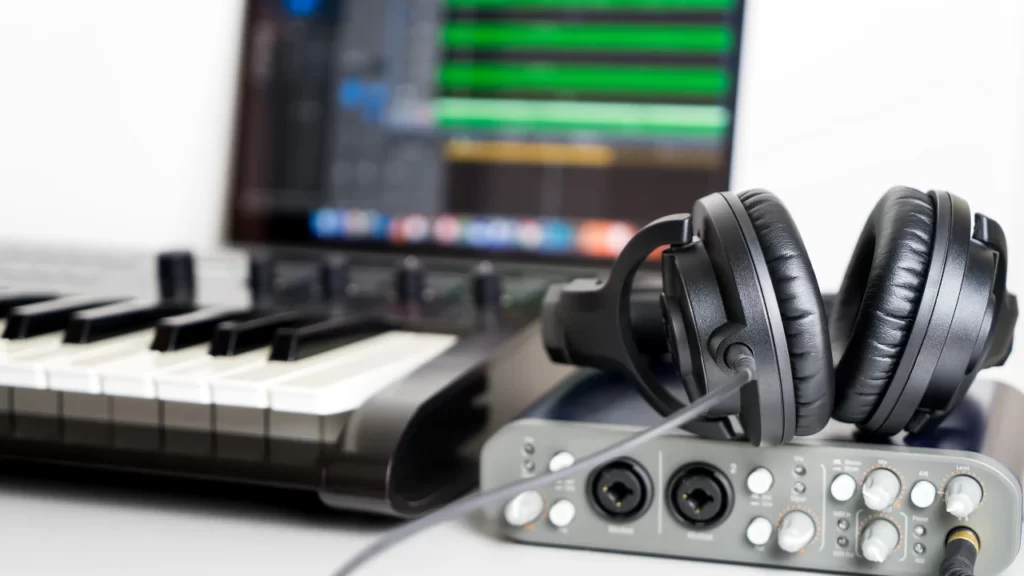
How to make music with only a laptop? Are you looking to enter the world of music production but need access to fancy studio equipment?
Fear not, as you can make music with your trusty laptop. With the correct software and tools, you can make great tracks and become known in music.
The first step is to choose the right software and tools for your laptop. Many options include Ableton Live, FL Studio, Studio One, and Logic Pro.
To find the right program for you, research and compare the unique features and benefits of each.
After getting your software, you can begin making music with virtual instruments. You can mix and master your music and share your creations with the world.
Choosing the Right Software and Tools
Selecting the correct software and tools is like choosing the ideal paintbrushes.
Your laptop is your canvas, and you need a set of software and tools that can help you create the music you envision.
Software that helps you streamline your process of creating music is crucial. This is important for your workflow.
One essential tool to consider is MIDI controllers. You can use these to play virtual instruments like you would with a physical one.
It would be best if you also had sample libraries. They have pre-recorded sounds for your music.
It would be best to have an audio interface to record instruments or vocals. Your software must be able to work with it.
Make sure your software works with the extra plugins you want. Plugins add effects and sound to your music.
You can make professional-quality music on your laptop using software and tools.
Creating Sounds with Virtual Instruments
Creating unique sounds can enhance the quality of your digital music.
Sound design is creating and manipulating sounds to achieve a desired result.
MIDI controllers are a popular tool for creating music with a laptop. These controllers allow you to play and manipulate virtual instruments in real time.
You can use them to record your performances or to trigger pre-made loops and samples.
Sampling techniques are also essential when creating music. You can sample and manipulate any sound to create a new and unique sound.
Layering sounds is another technique that can create more complex sounds. This involves combining different sounds to create a single sound.
Effects processing is the final step in creating sounds.
You can use effects like reverb, delay, and distortion to add depth and character to your sounds.
You can use these techniques for better music production.
Mixing and Mastering Your Music
Adjust the EQ and compression to make your tracks sound polished and professional. This is a significant part of mixing and mastering.
Begin by adjusting the volume of each instrument and getting a general idea of how your mix should sound.
Use equalization techniques to improve the sound of each part of your song. For example, if your bass guitar is too boomy, you can reduce some low frequencies to tighten the sound.
Conversely, if your vocals lack presence, you can boost the upper midrange to make them pop.
It’s time to use effects once you set the primary balance and EQ.
Reverb, delay, and other time-based effects can add depth and space to your mix. Distortion, saturation, and other harmonic effects can add warmth and character.
Using these effects sparingly and purposefully is essential. Too much can clutter your mix.
Finally, use audio compression techniques to control your mix’s dynamic range. This will ensure the loudest parts don’t overpower the quieter sections.
With these tools and techniques, you can finish your mix for mastering or release.
Laptops are suitable for music production.
How much your music production can benefit from a laptop in your setup may surprise you.
While desktop computers are the go-to for music production, laptops have come a long way.
They can now provide the necessary specs for a smooth music-making experience.
One of the most significant advantages of using a laptop is its portability.
You can take it wherever you go, whether to a recording studio, a live performance, or a different room in your house.
This allows for greater flexibility and creativity in your music-making process. Yet, there are a few things to remember when using a laptop for making music.
Latency issues can arise when using the built-in sound card. Investing in an external audio interface may be necessary.
Make sure your laptop can handle the music production software and plugins.
Before buying, make sure the software is compatible with your laptop. This will prevent issues caused by incompatibility.
Considering these considerations, a laptop can benefit your music production setup.
Conclusion: How To Make Music With Only A Laptop?
You’re now equipped with more information about making music with only a laptop.
Remember, it all starts with choosing the right software and tools that fit your style and budget. You can create virtual instruments and sounds from there to make your music unique.
Remember the importance of mixing and mastering your music. This gives it that professional sound.
Are laptops suitable for music production? The answer is yes!
With the right software and tools, you can create music that rivals that of a professional studio.
So, go ahead and let your creativity flow. With your laptop, the possibilities are endless. You might create the next big hit.
